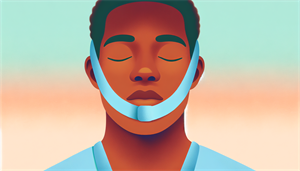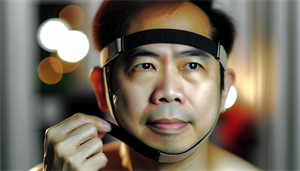Does the thunderous noise of your snoring turn night-time into a nightmare for your partner? Or do you find yourself waking up feeling unrested, with a dry mouth and a sore throat? Well, we might have a solution for you - the anti-snore chin strap. But, do chin straps work to stop snoring? Let’s find out.
Key Takeaways
-
Chin straps for snoring work by keeping your mouth closed to encourage nasal breathing, but they might not be effective for everyone, especially those with sleep apnea.
-
The effectiveness of chin straps can vary widely, and they don’t address the underlying causes of snoring, which can lead to mixed results in reducing snoring.
-
Alternatives to chin straps, such as mandibular advancement devices, nasal strips, lifestyle changes, and positional therapy, might provide more effective solutions for various snoring issues.
Understanding Snoring and Chin Straps

Snoring is a widespread annoyance that many of us know all too well. It’s caused by the vibration of soft tissue in your throat as you breathe in. This usually happens when your airways narrow, making the airflow turbulent and causing the tissue to vibrate. Some common causes of snoring include:
-
Obesity
-
Alcohol consumption
-
Smoking
-
Sleep position
-
Nasal congestion
By identifying and addressing the underlying cause of your snoring, you can find effective solutions to stop snoring, reduce or eliminate it.
One of the popular remedies on the market is the anti-snore chin strap, also known as the anti snoring chin strap. It’s a simple device, often made of neoprene, that wraps under your chin and around your head, held in place with adjustable Velcro straps. The main purpose of this chin strap is to keep your mouth closed during sleep, encouraging nasal breathing which can help reduce snoring. For those looking for a variety of options, anti snoring chin straps come in different sizes and materials to suit individual preferences.
The Science Behind Snoring
But, what causes this bothersome sound? As you drift off to sleep, your body relaxes, including the muscles in your mouth and throat. This relaxation can cause your airway to narrow, and as you breathe in, the air rushes through this narrowed space. The rushing air causes the relaxed tissues in your throat and mouth to vibrate, giving you the all-too-familiar snoring sound.
These vibrations can be loud enough to wake your partner, or even yourself, disrupting your cycle of deep, restful sleep. Despite its common occurrence, persistent snoring may be a sign of an underlying problem such as sleep apnea, especially if accompanied by daytime sleepiness, concentration problems, or high blood pressure.
How Chin Straps Aim to Help
Let’s now understand how chin straps work to tackle this noisy disturbance. Simply put, the chin strap is designed to keep your mouth shut while you sleep. This encourages breathing through your nose instead of your mouth, which can help reduce snoring.
The strap is made from materials such as sweat-absorbing fabric and is adjustable to fit different head sizes comfortably. While a chin strap can be a simple and cost-effective way to manage snoring, it’s essential to note that the effectiveness can vary between individuals, and it may not be sufficient for more severe cases such as obstructive sleep apnea.
Effectiveness of Chin Straps for Snoring
Despite the straightforward design and aim of chin straps, their effectiveness in reducing snoring is not as straightforward. Some people swear by their chin straps, claiming it has significantly reduced their snoring. However, others see little to no improvement.
In fact, clinical tests have shown that none of the anti-snoring devices, including chin straps, performed well enough to be recommended for regular use. This resulted in varied views on the efficiency of chin straps.
Factors Impacting Effectiveness
Several factors can influence the efficacy of chin straps. Notably, the fit of the chin strap doesn’t significantly impact its effectiveness in reducing snoring. Moreover, for individuals with sleep apnea, chin straps may offer little relief.
Another factor is the material used in the chin strap. Most chin straps are made from materials like:
-
Spandex
-
Polyester
-
Cotton
-
Nylon
These materials need to provide gentle support to keep the jaw closed effectively. Additionally, the chin strap’s compatibility with other treatments also affects its effectiveness. For instance, it might not be very effective on its own, but could still assist those using continuous positive airway pressure therapy or Positive Airway Pressure therapy to prevent mouth leaks.
Pros and Cons of Using Chin Straps
Although chin straps provide a straightforward and non-invasive method to curb snoring, considering their advantages and possible downsides is crucial. From affordability to potential side effects, let’s weigh the pros and cons of using chin straps for snoring.
On one hand, chin straps can be a cost-effective and straightforward way to tackle snoring. They are easy to use, require no complicated setup, and aim to improve sleep quality by encouraging nasal breathing. However, on the other hand, they can cause discomfort, move around or come off during sleep, and may even exacerbate snoring in some cases.
Benefits of Chin Straps
Chin straps for snoring offer several benefits. They are a budget-friendly option, costing significantly less than surgeries or bulky CPAP machines. Moreover, they are incredibly easy to use, providing a low-effort solution for snoring.
By keeping the mouth closed during sleep, chin straps encourage nasal breathing, which can reduce snoring. This can significantly improve sleep quality for individuals who snore through their mouth. Furthermore, the convenience and affordability of chin straps can make them an appealing option for many.
Drawbacks of Chin Straps
While chin straps can be beneficial, they’re not without their drawbacks. Long-term use can lead to jaw pain, discomfort, skin irritation, and even daytime jaw pain in some cases. Some individuals may experience issues such as skin irritation and discomfort if the chin strap is too tight, while others may find the chin strap moves around or comes off during sleep. Furthermore, if you’re a mouth breather, using a chin strap may lead to dry mouth, bad breath, or a sore throat. Lastly, chin straps may not be effective for everyone. They don’t address the root cause of snoring or sleep apnea for most people, potentially making them less effective.
Alternative Treatments for Snoring

With the mixed effectiveness and potential drawbacks of chin straps, it’s worth exploring alternative treatments for snoring. Some options to consider include:
-
Mandibular advancement devices
-
Nasal strips
-
Oral appliances
-
Positional therapy
-
Weight loss
-
Avoiding alcohol and sedatives before bed
-
Sleeping on your side
These alternatives might be more effective for you.
Regardless of whether you’re facing sporadic snoring or a more severe condition like sleep apnea, examining all available treatment alternatives is necessary. Let’s take a look at some alternatives to chin straps, each with its own unique approach to combating snoring.
Mandibular Advancement Devices (MADs)
Mandibular Advancement Devices (MADs) are a popular alternative to chin straps. These devices work by moving your lower jaw forward, preventing your mouth from opening too much during sleep.
While MADs have been found to be effective in reducing snoring for around 43% of individuals with mild to moderate sleep apnea, they may not work as well for everyone. However, with the ability to provide a custom fit and adjust the device as needed, MADs offer a flexible and potentially effective solution for snoring.
Nasal Dilators and Strips
Nasal dilators and strips are another alternative that aims to enhance airflow and reduce snoring. These devices work by expanding the nostrils, making nose breathing easier and reducing the vibrations that cause snoring.
Both nasal dilators and strips are easy to apply and can offer immediate results. These devices can be particularly helpful for individuals whose snoring is due to nasal congestion or obstructions. However, as with all treatments, their effectiveness will vary from person to person.
Lifestyle Changes and Sleep Position Adjustments
Sometimes, simple lifestyle changes can have a significant impact on reducing snoring. These changes may include:
-
Adjusting your sleep position
-
Losing weight
-
Avoiding alcohol before bed
-
Maintaining good sleep hygiene
-
Ensuring your nasal passages are clear before bed
Losing weight can alleviate snoring by reducing pressure on your airway. Similarly, clearing your nasal passages can make it easier to breathe through your nose, reducing the likelihood of mouth breathing which can exacerbate snoring. By evaluating and adjusting your lifestyle habits, you may be able to improve your sleep quality and reduce snoring.
Choosing the Right Chin Strap

If you opt to try chin straps, selecting the one that best suits your needs is essential. Considerations such as material and adjustability can make a significant difference in comfort and effectiveness.
The material of the chin strap can impact both its comfort and durability. Common materials include:
-
Neoprene
-
Spandex
-
Polyester
-
Cotton
-
Nylon
Moreover, adjustability is key to ensure a proper fit, which can enhance both comfort and efficacy.
Material Options
Neoprene is a popular material choice for chin straps due to its durability, stretchiness, and comfort. It is also washable and adjustable for a customized fit.
Other commonly used materials for chin straps include:
-
Spandex
-
Polyester
-
Cotton
-
Nylon
These materials are chosen for their comfort and ability to maintain the necessary tension to keep the jaw closed. When choosing a chin strap, consider both the material and your own comfort preferences.
Adjustability and Fit
The adjustability of a chin strap is a crucial factor in its effectiveness. An adjustable chin strap can provide a custom fit, ensuring the strap provides enough tension to keep the jaw closed without causing discomfort.
Ensuring a proper fit can help avoid potential side effects such as jaw soreness, headaches, and lightheadedness. A poorly fitted chin strap can cause discomfort and potentially exacerbate snoring, so it’s important to take the time to adjust your chin strap for a proper fit.
Safety Concerns and Side Effects

Although chin straps provide a straightforward solution for snoring, they might not be ideal for everyone. Particularly for individuals with sleep apnea, chin straps may not provide an adequate solution.
Moreover, as with any remedy, chin straps have potential side effects. These can include jaw soreness, headaches, and feelings of lightheadedness.
Proper Usage and Fit
To minimize potential side effects, proper usage and fit of the chin strap are crucial. A poorly fitted chin strap can lead to:
-
unnecessary pressure on the jaw joint and muscles
-
discomfort
-
jaw soreness
-
headaches
-
feelings of lightheadedness
Ensuring a proper fit not only improves the chin strap’s effectiveness but also enhances comfort. It should provide enough support to keep the mouth closed while still allowing some freedom to open if needed.
Recognizing Sleep Apnea
It’s important to note that while chin straps can help reduce snoring, they may not be an adequate solution for individuals with sleep apnea, a more serious sleep disorder. Sleep apnea involves repeated stoppages of breathing during sleep, often accompanied by loud snoring and feelings of exhaustion after a full night’s sleep.
Recognizing the signs of sleep apnea, including mild sleep apnea, is crucial as this condition, also known as sleep disordered breathing, often requires more comprehensive treatment plans. If you suspect you may have sleep apnea, it’s important to seek medical advice from a professional in sleep medicine to discuss appropriate treatment options, such as treating sleep disordered breathing, in the realm of clinical sleep medicine.
Summary
In conclusion, while chin straps can be a simple and affordable solution for some snorers, their effectiveness varies significantly among individuals. Also, they may not be suitable for those with sleep apnea. Alternatives such as mandibular advancement devices, nasal dilators, and lifestyle changes may offer more effective solutions for some individuals. It’s important to choose a solution that fits your specific needs and to seek medical advice if you suspect a more serious condition like sleep apnea.
Frequently Asked Questions
Do chin straps really stop snoring?
Chin straps alone are not a highly effective treatment for snoring, as they may not address the underlying causes like nasal obstruction or sleep apnea. It's best to consider other options rather than relying solely on a chin strap.
Is a chin strap or mouthpiece better for snoring?
A snoring mouthpiece is generally considered the better choice, but a chin strap can be an alternative for those who want to explore different solutions. If you want the most reliable option to stop snoring, a snoring mouthpiece might be the right choice for you.
Is it good to sleep with a chin strap?
Using a chin strap can improve sleep quality, especially if you often wake up due to snoring or mild sleep apnea, and it may also reduce morning headaches and fatigue. Give it a try if you're experiencing these issues!
What is the best chin strap for snoring?
You may want to consider the BRISON Anti Snoring Chin Strap. It's adjustable, lightweight, and breathable. Plus, some users have found the fit to run small.
Are chin straps comfortable for long-term use?
Yes, chin straps are comfortable for long-term use because they are made from breathable materials and designed for a snug fit. Try one out!


